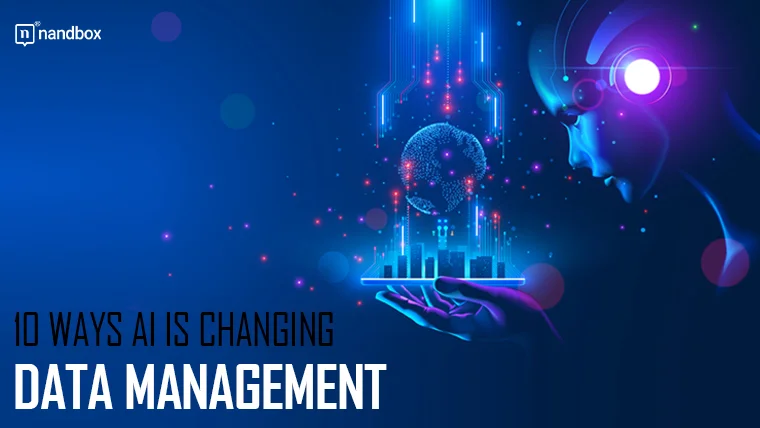In the era of big data, artificial intelligence (AI) has emerged as a transformative force, reshaping the landscape of data management. From enhancing efficiency to unlocking valuable insights, AI is revolutionizing the way organizations handle, process, and derive value from their data.
In this article, we’ll explore 10 ways AI is changing data management, ushering in a new era of innovation and effectiveness.
What Are the Top Data Management Priorities Enterprises Must Keep In Mind?
In the rapidly evolving landscape of data-driven enterprises, effective data management is crucial for maintaining competitiveness, ensuring compliance, and driving innovation. As organizations grapple with increasing volumes and complexity of data, several priorities emerge:
- Data quality and accuracy. Ensuring that data is accurate, consistent, and reliable is paramount for informed decision-making and maintaining trust in organizational data.
- Data security and compliance. Protecting sensitive data and ensuring compliance with regulations (such as GDPR and HIPAA) are critical for maintaining customer trust and avoiding legal consequences.
- Data integration across platforms. Breaking down data silos and integrating information from disparate sources is essential for a holistic view of organizational data. Automated data integration across platforms breaks down data silos and combines information from disparate sources, enabling a holistic view of organizational data.
- Advanced analytics and insights. Extracting meaningful insights from data to drive informed decision-making and gain a competitive edge is a top priority.
- Data governance and metadata management. Establishing robust data governance practices and managing metadata efficiently are crucial for maintaining data lineage, ensuring accountability, and complying with regulatory requirements.
- Efficient data lifecycle management. Managing the entire lifecycle of data, including storage optimization, archiving, and deletion, is also essential for maintaining cost-effectiveness and compliance.
- Natural Language Processing for data interaction. Improving user interaction with data by enabling natural language queries and enhancing data accessibility is essential for fostering a data-driven culture.
How Does AI Help With Tackling Data Management Priorities?
AI is proving to be a transformative force in addressing the evolving data management priorities of enterprises. Furthermore, generative AI development companies are empowering organizations to harness the full potential of their data by automating tasks, improving data quality, enhancing security, and contributing to advanced analytics.
Read more: AI in the Workplace: Managing Enterprise Data with ChatGPT
1. Automated data cleansing and quality assurance
AI-powered algorithms can automate the process of data cleansing and quality assurance. Additionally, by identifying and rectifying errors, duplications, and inconsistencies in large datasets, organizations can ensure that their data is accurate and reliable, laying the foundation for robust decision-making.
2. Predictive Analytics for Proactive Decision-Making
AI enables predictive analytics, allowing organizations to anticipate trends and make proactive decisions based on historical data. Moreover, this transformative capability empowers businesses to forecast demand, identify potential risks, and optimize strategies for enhanced operational efficiency.
3. Intelligent Data Integration Across Platforms
AI facilitates seamless integration of data across disparate platforms. AI-powered data analytics platforms like Redbird simplify this process to unify all your data in one place. Additionally, by understanding the structure and relationships within datasets, AI algorithms enable organizations to break down data silos and create a unified view, fostering better collaboration and information flow across the enterprise.
Data Classification
4. Dynamic Data Classification and Tagging
AI excels at dynamic data classification and tagging. Through machine learning algorithms, organizations can automatically classify and tag data based on its content, enabling efficient categorization and retrieval. This capability is especially valuable in compliance with data governance and privacy regulations.
5. Cognitive Search and Natural Language Processing
AI-powered cognitive search and natural language processing (NLP) enhance data discovery. Also, Users can interact with data using natural language queries, making it easier to extract meaningful insights. This democratization of data access fosters a more data-informed organizational culture.
6. Smart Data Security and Anomaly Detection
AI reinforces data security with advanced anomaly detection. By continuously monitoring data access patterns, AI algorithms can identify unusual activities indicative of security threats. Additionally, this proactive approach strengthens data protection and minimizes the risk of unauthorized access.
7. Automated Data Lifecycle Management:
AI streamlines data lifecycle management by automating processes such as archiving, retention, and deletion. This ensures that organizations adhere to compliance requirements and optimize storage resources, preventing the accumulation of redundant or obsolete data.
8. Personalized Customer Experiences Through Ai-Driven Insights
AI transforms customer relationship management by providing personalized insights. Also, by analyzing customer data, AI algorithms can predict preferences, behavior patterns, and purchasing trends, enabling organizations to tailor products and services for a more personalized customer experience.
9. Efficient Data Backup and Disaster Recovery
AI enhances data backup and disaster recovery processes by automating backup schedules and optimizing storage utilization. Also, in the event of a data loss or system failure, AI-driven recovery systems can quickly restore critical data, minimizing downtime and potential business disruptions.
10. Automated Report Generation and Data Visualization
AI simplifies data reporting through automated report generation and visualization. Also, by understanding user preferences and business objectives, AI tools can create customized reports, dashboards, and visual representations, making complex data more accessible and actionable for decision-makers.
Final takeaway
As organizations navigate the data-driven landscape, the integration of AI into data management processes is proving to be a game-changer.
From automating mundane tasks to unlocking predictive insights, AI is enhancing the efficiency, security, and strategic value of data. Embracing these transformative capabilities is not just a technological evolution but a strategic imperative for organizations aiming to thrive in the data-centric future. For that reason, employing the services and skills of a reliable digital partner with experience in integrating AI solutions into the enterprise’s workflow is crucial for timely, productive, and rewarding transformation.




